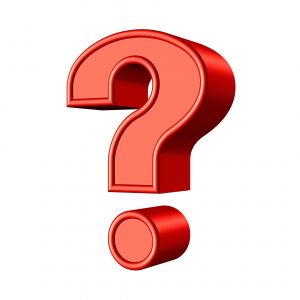Here’s a mistake I’m seeing more often: unnecessary question marks. For example:
I asked the manager why the restaurant didn’t offer meatless entrees? WRONG
That’s a statement, not a question.
Now try this one. Does it need a question mark?
I asked a question.
Obviously it’s a statement. If you read it aloud, you won’t hear your voice go up. What about this?
I asked why the bill was so high.
When you think about it for a moment, it’s just like the previous example – a statement. No question mark.
Read them together, and you’ll hear it:
I asked a question.
I asked why the bill was so high.
For comparison, here’s a true question:
Why is the bill so high? CORRECT
Let’s try a few more:
I asked Joe to pick me up at 7:30.
I wondered whether he would be on time.
I questioned whether he was trustworthy.
Those are all statements that should end with periods. How did you do?
Now try these (remember, reading them aloud will help):
Will you pick me up at 7:30
Is Joe going to be on time
Is he trustworthy
Those are all questions that should end with question marks.
Will you pick me up at 7:30? CORRECT
Is Joe going to be on time? CORRECT
Is he trustworthy? CORRECT



Some of the confusion may arise from the phenomenon of uptalking, when people end a sentence with a rising inflection during conversation. Example:
z’I went to the store? And I bought some clothes? I found a nice outfit?z’
Great comment, Darrell – I hadn’t thought about that! It used to be primarily a Southern speech pattern. There’s a wonderful Andy Griffith episode with Barbara Eden as a manicurist: “I do nails?”